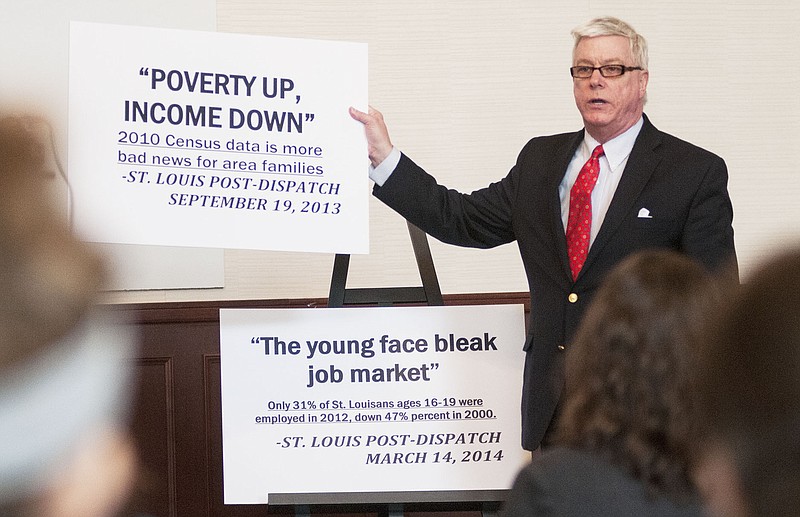When Missouri Lt. Gov. Peter Kinder's parents were born in the 1920s, Missouri held 18 U.S. Congressional seats, and now with 8, the state has lost some stance in Washington, D.C.
"Missouri is shrinking in importance," Kinder said on Friday. "We are half as important today as we were in the 1920s, the decade in which my parents were born into."
If Missouri doesn't pass Right-to-Work legislation, Kinder said in a visit to Westminster College, the situation could grow worse - causing an economic decline that would spark a domino effect. Poor economic status correlates to decreasing population, he said, which means less Congressional seats and representation for the Show-Me State.
Missouri House Bill 1099, called the "Freedom to Work Act," sponsored by Rep. Eric Burlison, R-Springfield, states that a person's employment shall not be tied to union membership, paying dues or donating to a charity without consent.
Gov. Jay Nixon criticized Right-to-Work when Missouri union members visited Jefferson City earlier this year, and it is likely he will veto the bill if it's passed in the General Assembly.
Kinder said Nixon gave a "very rosy scenario" of Missouri's economic status during the state of the state address in January.
"Maybe you buy that," Kinder said. "I have some facts to lay on the table for this discussion."
He referenced St. Louis Post-Dispatch articles, stating Missouri is one of two states to have median household income levels decline last year and 31 percent of 16-19 year olds in St. Louis were employed in 2012, which was a 47 percent decrease from 2000.
Kinder continued to discuss the status of St. Louis, the city that, Kinder said, is 40 percent of Missouri's population and 50 percent of its economic activity. In a report released from United Van Lines, a St. Louis-based transportation company, it states St. Louis is one of three cities people are moving out of quickest. New York and Chicago were the other two.
"We can't have a healthy Missouri economy if we don't have a healthy St. Louis economy," Kinder said.
He reminded the audience of Westminster students, faculty and staff of a thriving automobile industry in St. Louis less than a decade ago. The city was second to Detroit in auto production with four plants. Now, a single General Motors plant sits in Wentzville, a suburban municipality outside of St. Louis.
When the auto industry's decline struck, 78 percent of union auto workers on the assembly line were suddenly unemployed, according to Kinder.
"Those jobs are gone. They're gone and they're not coming back," Kinder said. "That's the effect, it's one of the effects, of forced union policy that you can see in the devastated lives of former employed union auto workers here in our great state of Missouri."
He also said young Missourians are moving to the south and west, where there is a higher number of Right-to-Work states.
"Young people leave Missouri to seek higher compensation," Kinder said.
Texas, he added, is growing in population the size of Jefferson City on a monthly basis and, because of its increasing population, has gained four Congressional seats since the 2012 Census.
Rep. Michael Frame, D-Eureka, will present an opposition to Right-to-Work noon Monday at Westminster College.
The Associated Press contributed to this article.
Brittany Ruess can be reached at (573) 826-2419 or [email protected].

